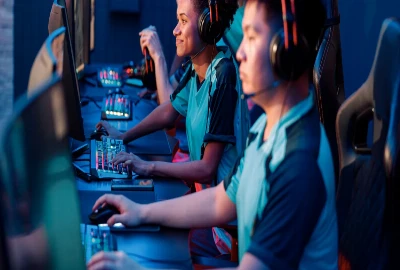Virtual Reality Concerts: The Future of Live Music?

The live music industry has always been about creating unforgettable experiences—moments where fans connect with artists beyond the music itself. But what happens when technology allows us to experience concerts without leaving home? Enter virtual reality concerts, a groundbreaking fusion of live performance and immersive digital technology that has been gaining traction since the pandemic era.
Why VR Concerts Matter Now
The COVID-19 pandemic accelerated interest in digital concerts, as artists and fans searched for new ways to stay connected. While livestreams became common, VR concerts took the concept further, allowing fans to feel like they were inside the venue rather than passively watching a screen.
The Big Question
The central debate is whether VR concerts can replace—or at least complement—traditional live music. With billions invested in metaverse technologies and VR headsets becoming more accessible, this question feels more relevant than ever.
What Are Virtual Reality Concerts?

To understand the appeal, we need to break down what makes a VR concert different from livestreams or traditional shows.
Defining VR Concerts
A virtual reality concert is a live or pre-recorded performance experienced through a VR headset, where fans can move around virtual venues, interact with avatars, and sometimes even influence the environment.
Key Features That Make Them Unique
360-degree immersion: Unlike livestreams, VR concerts place the fan in a 3D space where they can look around as if physically present.
Interactivity: From cheering with avatars to purchasing digital merch, VR concerts replicate and enhance real-world elements.
Accessibility: Anyone, regardless of location, can attend without worrying about tickets selling out or traveling long distances.
Popular Examples
Epic Games’ Fortnite has hosted virtual concerts featuring Travis Scott and Ariana Grande, drawing millions of attendees worldwide. Platforms like Wave and VRChat are also experimenting with interactive live music events.
The Advantages of Virtual Reality Concerts

Fans and artists alike see clear benefits to VR concerts, especially as technology improves.
Accessibility for Global Audiences
A major advantage is that VR concerts eliminate geographical barriers. A fan in Tokyo can attend the same concert as someone in New York, creating a truly global music community.
Enhanced Creative Freedom for Artists
Artists aren’t limited by physics. In VR, stages can float in space, light shows can be infinite, and performers can appear as fantastical avatars. This opens a new realm of creative storytelling through music.
Cost and Convenience for Fans
No travel expenses, no long lines, and no overpriced drinks—fans enjoy concerts from the comfort of their homes. For many, this makes live music more accessible and affordable.
The Challenges and Limitations of VR Concerts

While VR concerts sound revolutionary, they come with obstacles that need addressing before mainstream adoption.
Technology and Hardware Barriers
High-quality VR headsets can still be expensive, limiting access for many fans. Lag, motion sickness, and internet connection issues can also affect the experience.
Missing the Physical Atmosphere
For many fans, nothing compares to the energy of a live crowd, the vibrations of music in your chest, and the spontaneous moments that happen in real venues. VR can’t yet replicate this fully.
Monetization and Artist Concerns
While VR concerts allow for ticket sales and digital merchandise, the revenue models are still unproven compared to traditional touring, which remains the primary income source for many musicians.
How VR Concerts Are Changing the Music Industry

Despite limitations, VR concerts are already influencing how the music industry thinks about live performance.
Expanding Artist Reach
VR concerts allow artists to reach millions at once, breaking traditional venue capacity limits. For example, Travis Scott’s Fortnite concert drew over 12 million viewers simultaneously.
Creating New Revenue Streams
From selling NFTs and digital merchandise to exclusive VIP experiences, VR concerts present opportunities for artists to monetize creativity in new ways.
Influence on Touring and Promotion
Hybrid models may become the norm, where artists tour physically but also host VR versions of their shows to reach a wider audience.
The Social Side of VR Concerts: Community in a Digital World

Concerts are as much about community as they are about music. How does VR capture this?
Shared Virtual Spaces
VR platforms create environments where fans can meet before or after the show, chat, and even dance together using avatars. This fosters a sense of belonging and connection, even digitally.
Integration with Social Media and Streaming
Many VR concerts integrate with Twitch, YouTube, or TikTok, allowing fans to stream their perspective or interact with audiences outside the VR platform.
Fandom in the Metaverse
Virtual concerts may redefine fandom, where fan clubs gather not in physical arenas but in persistent virtual worlds that exist beyond a single performance.
The Future of Virtual Reality Concerts

Looking forward, VR concerts may not just supplement live shows—they could revolutionize the entire live music industry.
Technology Improvements Ahead
As VR headsets become more affordable and AR (augmented reality) technologies advance, VR concerts will become more immersive and mainstream. Improved haptic suits could even simulate the feeling of bass vibrations, making the experience closer to reality.
Potential for Hybrid Concert Models
The likely future is a blend: artists offering in-person concerts alongside VR counterparts, allowing fans to choose their experience. This hybrid approach could maximize both accessibility and authenticity.
What This Means for Fans and Artists
Fans gain more options to experience music their way, while artists can scale performances, reach global audiences, and innovate creatively. The result could be a new era of live entertainment where no fan is left out.




